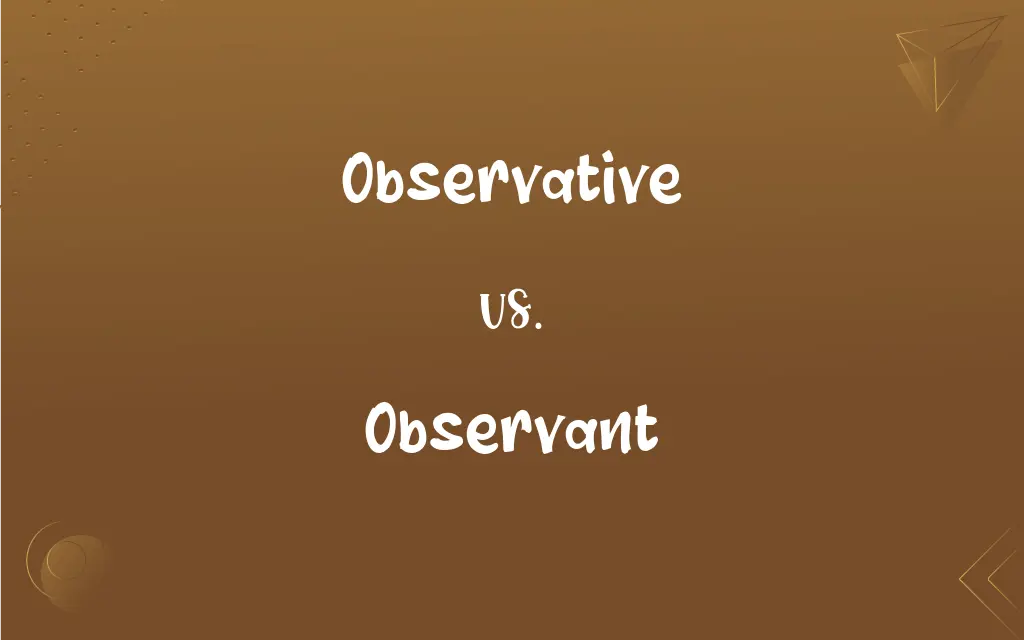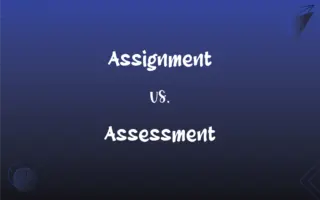Observative vs. Observant: What's the Difference?
Edited by Aimie Carlson || By Janet White || Updated on October 7, 2023
"Observative" pertains to the act or process of observing, while "Observant" describes someone who is attentive and notices details.

Key Differences
The English language often presents words that seem synonymous at first glance but carry different nuances. "Observative" and "Observant" fall into this category. "Observative" is a term that relates to the act or process of observing. It emphasizes the action or behavior of observing itself. For instance, a person might adopt an observative approach when studying a particular subject, implying a systematic, active method of watching or scrutinizing.
On the other hand, "Observant" has more to do with a person's innate quality or character trait. An observant individual is someone who is naturally attentive, quick to notice, or keenly aware of their surroundings. It's less about the act and more about the inherent characteristic. If someone is described as observant, it suggests they regularly pick up on details others might overlook.
While both words revolve around the concept of seeing or noticing, their usage can differ based on context. "Observative" might be used in a more scientific or academic setting to describe a method or approach. For example, observative studies in science involve close monitoring without intervention. In contrast, "Observant" can be applied more broadly, from describing a detective's keen eye for detail to noting someone's adherence to religious customs.
Furthermore, "Observant" can also carry cultural or religious connotations. For instance, in the context of religion, an observant person might be one who follows religious laws and customs closely. On the flip side, "Observative" remains more neutral, generally devoid of such cultural or religious implications.
Comparison Chart
Basic Definition
Relating to the act of observing.
Being attentive and noticing details.
ADVERTISEMENT
Contextual Usage
Scientific or academic settings.
Broadly used, from daily observations to religious adherence.
Focus
Emphasizes the action of observing.
Emphasizes the quality of being attentive.
Connotations
Neutral, associated with methodical watching.
Can imply keen awareness or strict adherence to rules/customs.
Common Descriptions
Observative study, observative approach.
Observant individual, observant of traditions.
Observative and Observant Definitions
Observative
Relating to the systematic act of watching or noticing.
The observative methodology ensured unbiased results.
ADVERTISEMENT
Observant
Demonstrating an alert and attentive nature.
The observant child picked up languages quickly.
Observative
Pertaining to keen scrutiny without intervening.
His observative stance allowed him to gather raw data.
Observant
Quick to notice or perceive things.
She was observant of even the slightest changes in her environment.
Observative
Concerned with detailed examination.
The observative journal documented the daily occurrences.
Observant
Keenly aware of one's surroundings.
Being observant helped him navigate the unfamiliar city.
Observative
Emphasizing the behavior of observation.
She adopted an observative role in the experiment.
Observant
Having or showing keen perceptiveness; perceptive
An observant traveler.
An observant memoir.
Observative
Characterized by a focus on monitoring.
The observative tools captured the phenomenon accurately.
Observant
Diligent in observing a law, custom, duty, or principle
Observant of the speed limit.
Observative
Observant; watchful
Observant
Alert and paying close attention; watchful.
The observant police officer noticed that my tax disk was out-of-date.
Observative
Observing; watchful.
Observant
Diligently attentive in observing a law, custom, duty or principle; regardful; mindful.
I was normally observant of the local parking restrictions.
Observant
Taking notice; viewing or noticing attentively; watchful; carefully attentive; as, an observant spectator; observant habits.
Wandering from clime to clime observant stray'd.
Observant
Submissively attentive; obediently watchful; regardful; mindful; obedient (to); - with of, as, to be observant of rules.
We are told how observant Alexander was of his master Aristotle.
Observant
One who observes forms and rules.
Observant
A sycophantic servant.
Silly ducking observants,That stretch their duties nicely.
Observant
An Observantine.
Observant
Paying close attention especially to details
Observant
Quick to notice; showing quick and keen perception
Observant
(of individuals) adhering strictly to laws and rules and customs;
Law-abiding citizens
Observant of the speed limit
Observant
Paying strict attention to details.
As an observant student, he excelled in his classes.
Observant
Following customs, rules, or laws closely.
He was observant of religious traditions.
FAQs
Is "Observative" commonly used in daily conversation?
It's less common than "Observant" and often appears in specific contexts like academic settings.
Can someone be observant without being actively observative?
Yes, one can have a keen awareness (observant) without actively observing (observative).
Can both terms be used interchangeably?
Not always, as "Observative" focuses on the act while "Observant" denotes a quality.
Is "Observative" limited to visual observation?
No, it can encompass other senses, like auditory observation.
Is every observative action done by someone observant?
Not always. One can perform an observative action without being inherently observant.
Is "Observative" a newer term in the English language?
It's less commonly used than "Observant", but not necessarily newer.
Can "Observant" also mean following religious customs?
Yes, it can denote strict adherence to religious rules or customs.
Can "Observant" refer to someone's nature?
Yes, describing someone as observant suggests they naturally notice details.
In what settings might "Observative" be most appropriate?
Academic, research, or contexts emphasizing the act of observing.
Can "Observative" be used outside of a research setting?
While less common, it can denote any detailed, methodical observation.
Are observant people always observative?
Not necessarily. They might have an inherent attentiveness without always actively observing.
Does "Observative" imply a passive role?
It implies a role of watching without intervening, which can be passive.
How might one use "Observative" in a scientific context?
It might refer to an observative study or method where phenomena are watched without intervention.
Is being observant a valued trait in many professions?
Yes, professions like detective work, research, and artistry value observant individuals.
Which term is broader in its applications?
"Observant" has broader applications, from daily life to religious contexts.
About Author
Written by
Janet WhiteJanet White has been an esteemed writer and blogger for Difference Wiki. Holding a Master's degree in Science and Medical Journalism from the prestigious Boston University, she has consistently demonstrated her expertise and passion for her field. When she's not immersed in her work, Janet relishes her time exercising, delving into a good book, and cherishing moments with friends and family.
Edited by
Aimie CarlsonAimie Carlson, holding a master's degree in English literature, is a fervent English language enthusiast. She lends her writing talents to Difference Wiki, a prominent website that specializes in comparisons, offering readers insightful analyses that both captivate and inform.































































